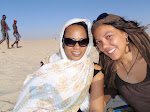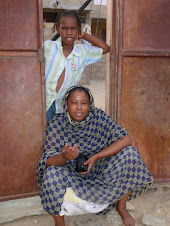Monday, December 28, 2009
A Little Kinyarwanda Lesson
I remember sighing an awful lot when starting to learn a new language again. My brain was questioning my actions – TWO dialects in the same year? I ignored these inquiries, opened my Kinyarwanda book, started making note-cards and prepared myself to make embarrassing conjugation and pronunciation mistakes. And that I did, but as they say in Rwanda Nyanza
Training is over now and I will be moving to my site the 29th to start settling in before the school year starts February 1st. Just for fun – in the past couple months, these have been some of my favorite Kinyarwanda words.
Umudugudu – Village
Ikibazo – Question
Umukorerabushake – Volunteer
Ubuzima – Life
Ubumwe – Unity
Ikivumvuri – Beetle
Ceceka! – Shut-up
Sometimes two words are spelled the same, but pronounced differently. Don’t confuse them!!
Gusura – To fart or Gusu(uu)ra – To visit
Umusambi – plastic mat or Umusa(aa)mbi – bird
Kurira – To cry or Kuri(ii)ra – To climb
And then there are the great sentences you can use.
Umuzungu kuruhu, umunyarwandakazi mu mutima – Foreigner by skin, Rwandan by heart.
Yaba weeee!!! – oh crap
Igisunzu kibi kiruta uruhara – having at least a tuft of hair is better than being completely bald.
Nzabakaranga – I will fry them (In the context of my kids at school – fry them with a difficult exam and assignment…)
Gutera indabo mu modoka – To throw flowers in a car… aka to vomit.
Occasionally, it’s just the context in which you use a word.
Umuhinzi is a farmer, but if you call a man an umuhinzi you could be calling him a womanizer.
Mfite amazi literally means to have water, but careful, instead of a bottle of it, you might be saying you have water in a sexual way…
Gakweto means small shoe and is used as another name for teacher because he/she doesn’t have enough money to but a good shoe.
Onward and forward I move in my gakwetos as an umukorerabushake. Training is finally over and I am ready to start carving out a place in my town called Rugabano in the Karongi district. My small rustic house is waiting and the freshman and sophomores are soon preparing to come to the boarding school. A new year, a new adventure, I welcome 2010. Stay tuned.
Subscribe to:
Comments (Atom)




